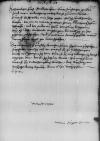Letter #2305
Anton FUGGER to Ioannes DANTISCUSAugsburg, 1540-04-13
| received Heilsberg (Lidzbark Warmiński), 1540-06-10 Manuscript sources:
| ||||
Text & apparatus & commentaryPlain textText & commentaryText & apparatus
Dem Hochwirdigen Fursten und Herren, / hern
Auf
Hochwirdiger Furst, / gnediger her. /
Euren Furstlichen Gnaden seind mein underthenig willig dienst zuvoran beraitt. /
Eurer F(urstlich) G(naden) schreiben mir yetzo gethan, / hab ich sambt zwayen briefen, / der ain an meinen gnedigen herren marggraf
Das wiltnus ol so Eur F(urstlich) G(naden) bemelten
Thue mich hiemit Euren F(urstlich) G(naden) underthenigklich bevelchen./
Dat(um)
E(uer) F(urstlich) G(naden) unterdeniger


 BCz, 1597, p. 1018
BCz, 1597, p. 1018